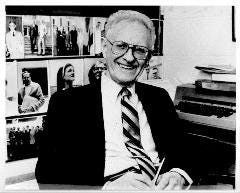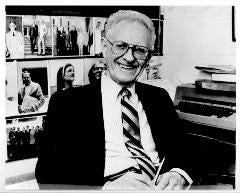'The moral, ethical and honorable sun'
Let me introduce you to Russell J. Jandoli and what he means to me
His was always just a name to me.
An unwieldy one at that.
Russell J. Jandoli.
Namesake of the Russell J. Jandoli School of Journalism and Mass Communication at St. Bonaventure University, as it was known when I was a student in the late 1990s. It does not roll off the tongue, and it was always hell to try to fit it on one line on our resumes.
As a student, I knew the basics about the man who founded St. Bonaventure’s then-journalism department, which is now the Jandoli School of Communication. I knew he was revered by generations of St. Bonaventure journalism graduates. I knew that when the late Dr. Leo Keenan (from the school’s English department) invoke his name in a note to me, it was the highest possible praise.
But it was still just a name. I was young, eager to make my mark on the world. Eyes ever on the horizon.
A life lived in journalism is one that's inextricably linked to certain people. I never knew Dr. Jandoli, but my journalism life is forever linked to him.
Not just because I graduated from the school that bears his name, or because I teach there today. But because his legacy, his life, was passed to me by my professors and my mentors.
On Monday, Jandoli’s legacy was celebrated at Hearst Tower in New York with the 63rd annual Hellinger Awards1, which are presented to the Jandoli School’s top graduates.2 And while the focus of the day was on Deandre Allen and Marnique Olivieri-Panepento, the recent graduate honorees, Dr. Jandoli was omnipresent.
The more stories I hear about this man, a giant in the field of journalism education who doesn’t even have his own Wikipedia page, the more honored I am to carry on a small part of his legacy.
“He is, for generations of St. Bonaventure journalism and communications graduates, the moral, ethical and honorable sun in our professional universe, so great was his impact and so powerful was his presence,” my friend and mentor Mike Vaccaro said in his keynote speech on Monday.
“The teacher can only lead you into such situations as those noted, apprising you of hte ground rules, encouraging you to write all kinds of copy, trying to make you come to understand that every time you sit down to write, you must meet the need facing you. Nothing remains the same except that one ineluctable fact, that unchanging tenant, you learn to write by writing.”
Jandoli was a reporter for Time Magazine and an editor of publications of the War Department. He covered the signing of the treaty between the United States and Japan ending World War II from a B-29 Bomber hovering over the U.S.S. Missouri. (“I stopped complaining about media dining room cold cuts after that,” Vaccaro cracked).
A few years later, he was an English professor at St. Bonaventure when, as Vaccaro told us on Monday, the university president announced at graduation that the school would be launching a journalism department, and that he, Jandoli, would be leading it. “It was news to him,” Vaccaro said.
Jandoli held that job for 34 years, building pound-for-pound, one of the best journalism programs in the country.
A Few Clues
You learn to write by writing
Writing is Thinking. You cannot write beyond the level of your innate and acquired intelligence.
Beyond informing, influencing, and serving others, the chief purpose of writing is to be read or heard. The writing process remains incomplete until your words are printed or spoken.
Everything you write must have its own clearly-definable purpose. Be guided by it.
Writing prowess depends on study, experience, close observation and application of what you know and can learn; develop all those assets.
The better part of the writing princess lies in thinking, planning, research, copywriting, rewriting, and polishing. The first draft may only take a minor fraction of the overall time required to complete a piece.
Write at length and in depth. The best writers are prolific.
Clarity, simplicity, euphony, directness — these are among the most desirable attributes to seek in your writing.
Aim high in mind and spirit. Read the best models you can. Accept the fact that a piece of writing is always subject to improvement. Hemingway has been quoted as saying: “We are all apprentices in a craft where no one is master.” Writing, in its optimum manifestation, attains to art.
Accept criticism readily. Avoid building up a Narcissus complex.
It’s fitting that the idea for this essay came in New York City.
For many years growing up, my professional dreams were inextricably linked to New York. I wanted to live there, and I wanted to work there.
Life worked out differently, wonderfully. But our regular family trips to New York to take our daughter to Broadway3 are often filled with twinges of regret for me.
I think of life in the big city, living the life there as a writer, a media member, the life I wanted for so long (or thought I wanted), and it always makes me a little sad that I never made it there.
As you get older, it’s natural to look back at lives not lived.
But it does no good to focus on those and ignore the one you are living right now.
And in a way, that’s where Dr. Jandoli’s legacy comes in.
Because location didn’t matter. Being tucked in the corner of Western New York didn’t matter. Location doesn’t define who you are, what you have done, or more importantly, what you can do.
“Russ Jandoli only dreamed big dreams,” Vaccaro said in his speech. “And he insisted that those of us in his counsel did the same. As a result he would attract the biggest names in journalism and broadcasting and advertising and public relations to find their way to the foothills of the Alleghenies … his was a vision beyond measure. He built this. He literally created it, and crafted it, with little other than his beautiful imagination and his bountiful will.”
I keep the folder near my desk at all times.
It’s a green folder with a clear plastic front that’s been become cloudy over decades. The once white sheets of paper are a little browned. I have no idea where I got it — I assume my sister, but I don’t remember.
It’s 10 pages, typed single space, all by Russell J. Jandoli. It looks like it was typed by the man himself. I treat it like a sacred text.
It’s writing advice, advice for the teaching of writing, for how to get better as a writer, his thoughts on New Journalism.
The interstitial text in this post has all come from this document. It’s delightful, old-school, well-worn advice on writing and life. If you’ve read Strunk and White, if you’ve read On Writing Well, you’d recognize the vibe.
It’s a reminder that this man, who for so long was just a name to me, has so much to teach me and all of the students in the school that bears his name.
Do some writing every day without fail. LET NO INTRUSION INTERFERE. As with the professional artist and musician, it’s a matter of priorities. No matter what, you must set aside a particular hour or more every day in which you will write — and never, never violate it — NEVER.
Did I just write a nut graph? I did, I did indeed. Please clap.
No, I did not win. Not that I deserved to, but I take great pleasure in reminding the faculty members who were there back then that I didn’t win.
If you have the means, Gutenberg! The Musical is well worth your time.




